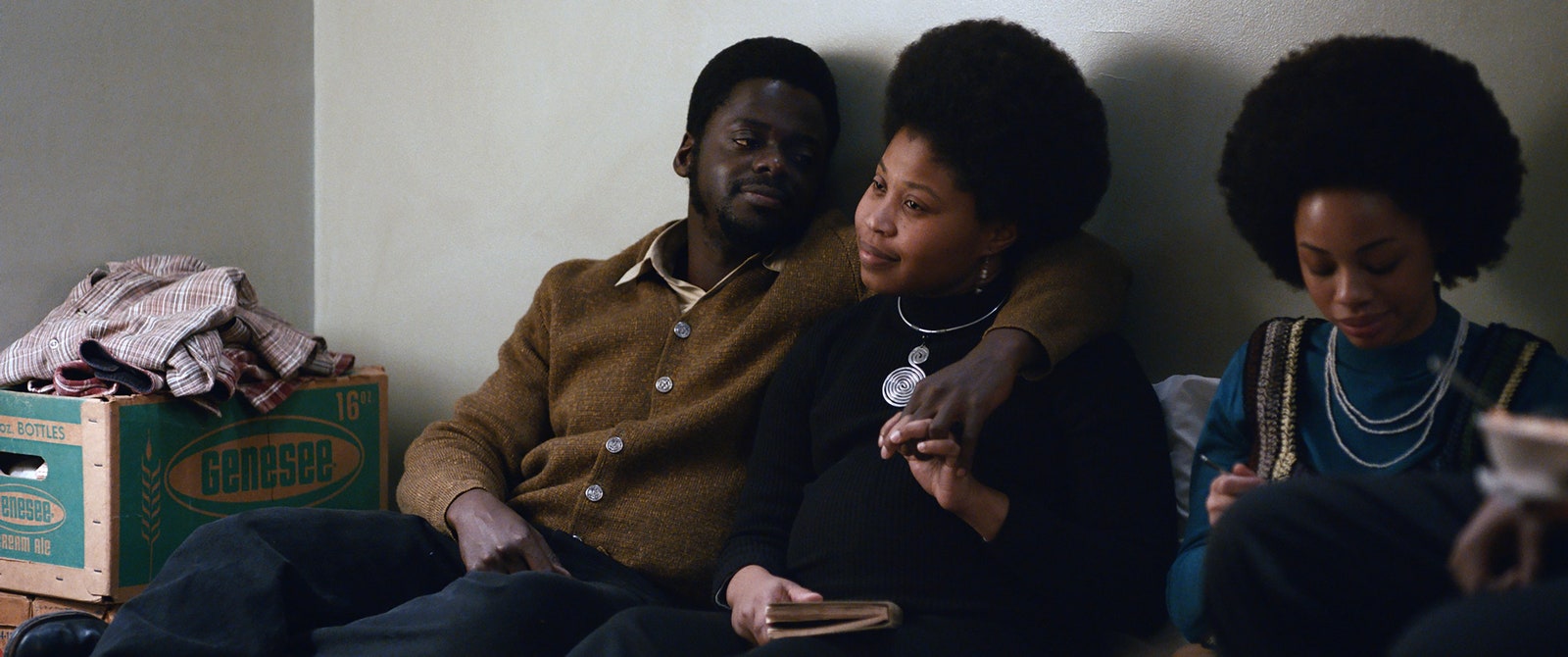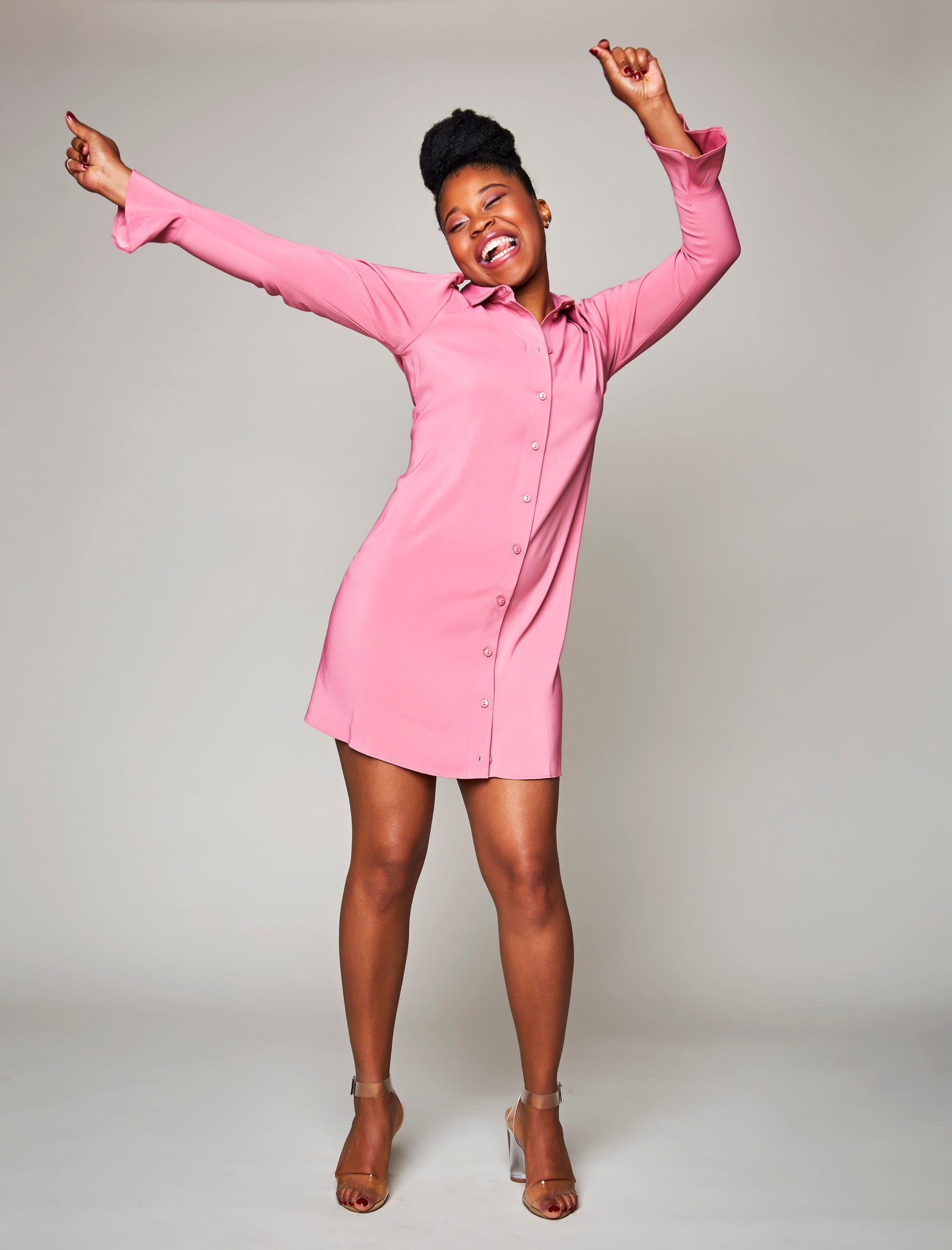“We don’t often get to see a Black woman desired, wanted, and chosen,” the actor says of her role opposite Daniel Kaluuya.

Getting to Know Dominique Fishback, the Powerful Heart of ‘Judas and the Black Messiah’
Dominique Fishback takes matters into her own hands. When the actor from The Deuce and The Hate U Give found herself between jobs a few years back, she started writing an anthology series for herself to star in. It was going to be a Romeo and Juliet story, set within the Black Panther Party. Fishback says she was inspired by A Taste of Power, a book she was reading by Elaine Brown, a Black Panther in the Oakland chapter.
“I was like, If I’m not getting cast in a role, I’m going to make my own,” the 29-year-old tells me over Zoom from her Brooklyn apartment. At the time Fishback had no idea that director Shaka King was working on his own Black Panther story—or that she’d be his first pick for a key role.
In Judas and the Black Messiah, streaming February 12 on HBO Max, Fishback plays Deborah Johnson, fiancé of Black Panther chairman Fred Hampton (Daniel Kaluuya). The film, set in the late 1960s, tells the true story of Hampton’s betrayal by an undercover FBI informant who was recruited to join the Panthers (Lakeith Stanfield). In real life Deborah went on to become a leading activist and writer in her own right, and now goes by the name Akua Njeri.
Fishback, a Brooklyn native, says she never left Deborah once the cameras stopped rolling, even keeping a journal the character uses in the film with her at all times. “I drew pictures and wrote poems,” she says. “I filled every line.” When she wasn’t writing, Fishback listened to Nina Simone and read Langston Hughes to help her better understand her character’s worldview.
And the relationship between Deborah and Chairman Fred was far more than just a love story for Fishback. “We don’t often get to see a Black woman desired, wanted, and chosen,” she says. “In The Notebook, Allie didn’t have to do nothing for no one! All of a sudden, Noah saw her and was like, ‘I’m going to climb on this bridge and hang from it,’ to get a date with her. We don’t get to have that. Chairman Fred loved Deborah for her intellect and her mind. It was really important to me that we see that.”
While Judas and the Black Messiah isn’t like the traditional Valentine’s Day box-office offerings, Fishback finds the February 12 release date apropos. “It’s about the beauty and transcendence of love,” she says. “It is about a love for the people.”
AdvertisementHere, Fishback speaks to Glamour about being hand chosen for the role, her hopes for the film’s lasting impact, and, naturally, what she wants to wear to the Oscars. “This was an experience that changed my life,” she says. “It changed me as a person, as an artist, and as a woman.”
Glamour: How did you get cast in Judas and the Black Messiah?
Dominique Fishback: A few years ago I got an email that said, “Shaka King wants you to play Deborah Johnson, Fred Hampton’s fiancé, for a movie he’s making with Daniel Kaluuya, Lakeith Stanfield, Ryan Coogler, and Charles King.” I had to reread the email a couple of times. I was like, “Wait, are they saying the part is mine? Or that Shaka wants to meet me? It sounds like they’re saying it’s mine, but that can’t be, considering all of these people attached.”
I met with Shaka at a café in Brooklyn, and he was like, “The role is yours.” I asked him if he had to talk to somebody to confirm, because I didn’t want to get too excited. He laughed and said, “No, it’s yours.” I would have been excited just to audition for the part, so I was really moved and honored that he wanted to offer it to me.
What were your first thoughts when you read the script?
I wrote Shaka a whole long email about all of the things I loved and then I said, “I have thoughts, but I don’t want to overstep, so let me know if you want to hear them.” He said, “You’ll be playing her—you can’t overstep. Give me your notes.” So I gave him my notes, and that was the kickoff to how I became a part of the story. I would write Shaka three-page papers on my character and women in the Panthers, and he would always make time to spend with me to talk about these things.
What was one of your notes?
In the film Deborah asks Chairman Fred if he likes poetry. And then for the rest of the film, we didn’t hear a poem. The Panthers were very poetic people, and I thought we would miss an opportunity if we didn’t hear one. Shaka was like, “I think you’re right. Do you want to take a shot at that poem?” So I wrote the poem that Deborah reads in the movie. In my spare time I started writing a lot of poetry, specifically about love. This year I plan to put out a book of poetry. As artists, we’re here to help make people feel like they’re not alone.
Tell me more about the research you did to prepare for the role.
There were so many different chapters of the Panthers, and each chapter was orchestrated a bit differently. Elaine Brown’s A Taste of Power gave me a general idea of a woman’s perspective in the Panther party, but it wasn’t specific to the Chicago Panthers. To know more about Chairman Fred and the Chicago Panthers, I read The Assassination of Fred Hampton by Jeffrey Haas. I would randomly meet with Shaka at different cafes around Brooklyn and tell him what I was reading, and he’d tell me what he was reading. It gave us a shorthand, which I think was important while we were on set. When I had notes or ideas, I wasn’t afraid to share them. If I pushed something, he knew it was only because I was thinking in terms of the women and this story.
AdvertisementJudas and the Black Messiah is a very intense and powerful film, which seems like a very heavy weight to carry with you day in and day out. Was it possible to unwind after a day of shooting?
None of us really knew what we were getting into. As Black artists, there’s a responsibility that we have to tell this story, do it justice, and do right by the people, the family, and by the Black Panther Party. We had that consciousness, but we had no idea what the film would do to us spiritually. We constantly felt like the spirit of Chairman was on the set. As a cast, we clung to each other. Even the producers and directors’ assistants said they had never been as close to each other on any other film they had worked on. There wasn’t much of a separation between us. We’d all even visit the set if we had a day off from shooting—we were giving so much and probably not sleeping enough, but any chance we had, we wanted to be around each other.
How do you think the film speaks to our current climate?
The movie was supposed to come out in August last year, which was during the heart of the BLM movement. It was already such a time of civil unrest between the cops and protesters. I feel like if it had come out then, it’s possible it could have been perceived wrong with people feeling so heightened, separated, and hopeless. I know that I felt hopeless. Black people have been living this reality for a long time, and a lot of people came to consciousness about all of the injustice and how embedded it was in our society, our school systems, the food that we eat, and the communities we come from.
People have expanded their minds, so I think the truth that this movie tells can now better resonate with audiences. I think that with the inauguration, many of us have hope. But I know there are still a lot of Black and brown people who are not hopeful. I read a post that said, “It’s okay to be nervous about the future, and excited that a woman of color is in the White House. It’s okay to vote for Biden, and still be unsure.” It’s okay to have that duality, because that’s what life is. So in that sense, I think the timing is right.
AdvertisementCan you share any memorable moments off set, hanging out with Daniel or Lakeith?
Once, we all went roller skating, and local kids started to hear that Daniel was there. Word got around, and this girl came up to him and said, “You’re not famous. Are you famous? You’re not. But can I have your autograph?” I think she was so shocked that he was there in a skating rink. How could the guy from Get Out and Black Panther be in this Cleveland skating rink? That became a running joke with us, and it was really exciting to see that kind of response. We also went to the Cleveland School of the Arts on our day off to see the students act, and we did talk-backs. We went to the Cleveland Boys and Girls Club and played basketball and catch with young kids. We had so much fun.
I know you’re a poet and spoken-word artist. Are you also just as obsessed with Amanda Gorman as we are?
During the inauguration, all I could think about was how brave and courageous she was to accept that call. We are in a heightened place in society where it is dangerous to stand behind something that you believe in and to put your art and your voice on something. I am sending her love and light for her bravery. If I ever get called for something so profound, I’ll remember what she did—that she stepped up at such a young age to be that representation and to speak that truth.
Lastly, while we have no idea what the Oscars will look like this year, what would you wear to the hypothetical awards ceremony to beat all awards ceremonies?
I’m a romantic, so it would have to have some kind of romantic flair, but with a hint of edge. In high school, I was the captain of my basketball team and played football, but I also won prom queen. At Pace University, I was the theater nerd who also won homecoming queen. So I always feel like there’s a duality in me.
So, Bridgerton meets Brooklyn.
Everybody keeps talking about Bridgerton and is surprised that I haven’t seen it yet! It’s right up my alley, but I’ve been doing so much press and writing a lot that I haven’t been able to start. I want it to be on a day where I can just lay back, enjoy the romance, and get giddy inside like a teenager.
Caitlin Brody is the entertainment director at Condé Nast.
This story originally appeared on: Glamour - Author:Caitlin Brody



























